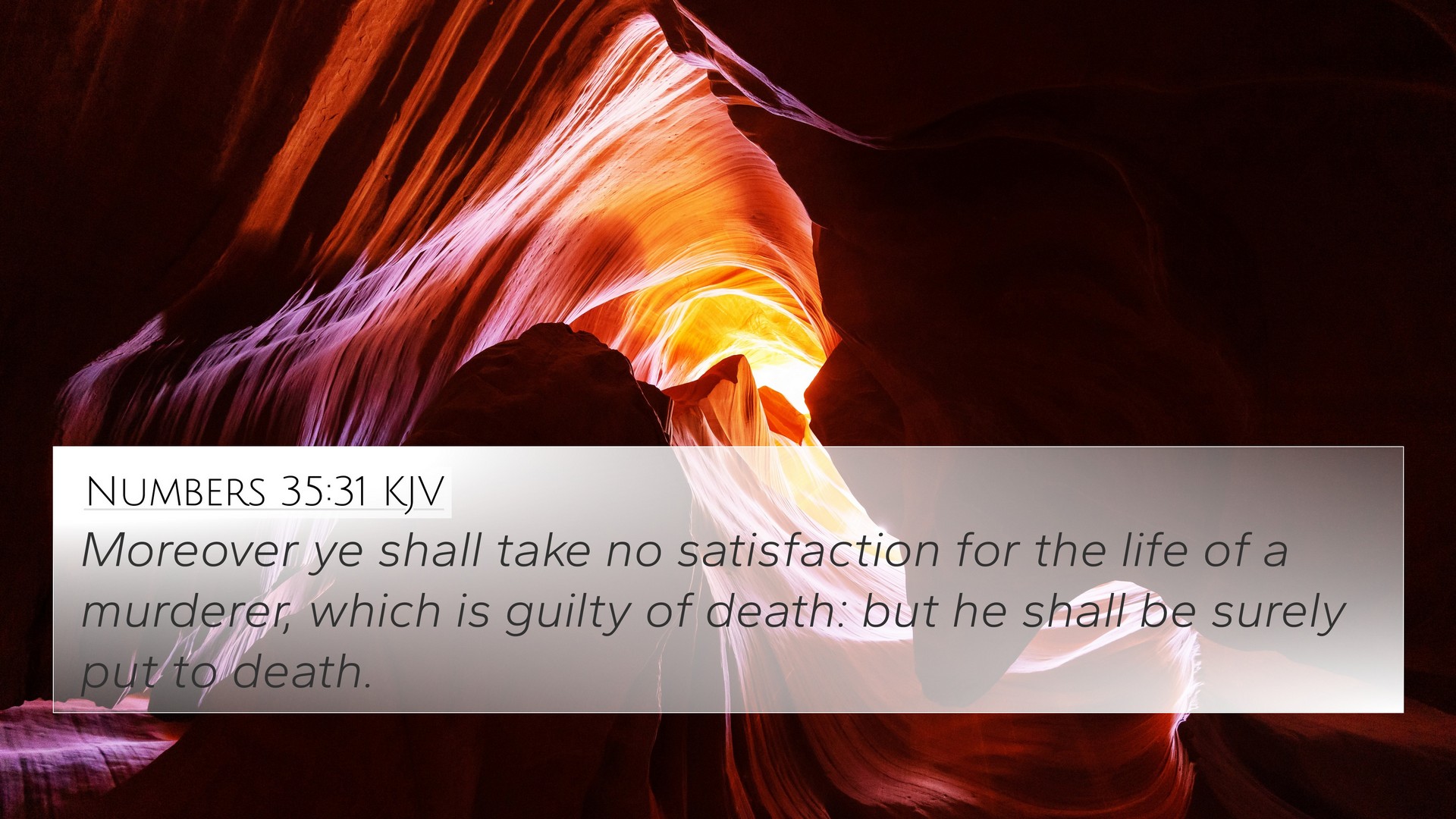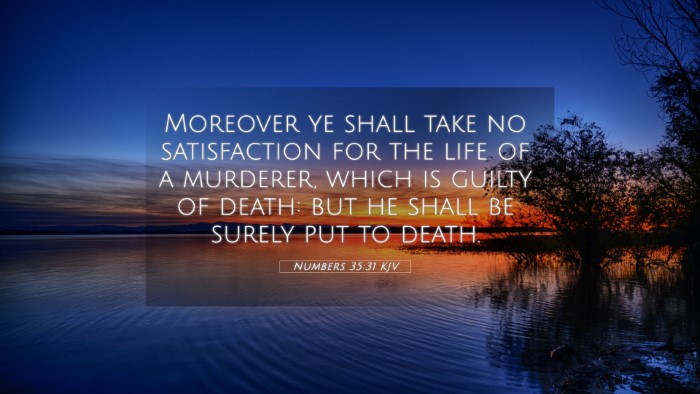Understanding Numbers 35:31
Numbers 35:31 states: "Moreover, you shall take no satisfaction for the life of a murderer who is guilty of death, but he shall surely be put to death." This verse emphasizes the seriousness of murder and the necessity of just punishment, reflecting deeper theological principles concerning justice and mercy. Below is a summary of the meanings gleaned from public domain commentaries.
Summary of Insights
-
Justice and Accountability:
According to Matthew Henry, this verse underscores the absolute nature of justice in God's eyes. The death penalty for murderers is a divine decree which serves to uphold the sanctity of life. Henry emphasizes that God takes murder seriously as it disrupts the divine order of creation and community.
-
Divine Law:
Albert Barnes notes that the law outlined in this verse illustrates God's displeasure with murder and establishes a moral and societal standard. The reference to "satisfaction" implies that no substitutionary ransom or compensation can absolve the gravity of the crime committed, thus reinforcing the inevitability of divine justice.
-
Moral Implications:
Adam Clarke expands on the moral implications of this law, noting that society must uphold justice not merely for retribution but also for the preservation and respect of life. Clarke suggests that the rigid structure of this commandment serves preventative purposes for potential offenders.
Cross-References
This verse finds connections to several other scriptures, reinforcing its themes of justice and the sanctity of life:
- Exodus 21:12 - "He who strikes a man so that he dies shall surely be put to death."
- Leviticus 24:17 - "Whoever kills any man shall surely be put to death."
- Deuteronomy 19:11-13 - Provides guidelines for dealing with a murderer and the importance of justice.
- Matthew 5:21-22 - Jesus expands on the commandment against murder, emphasizing its internal implications.
- Romans 13:4 - "For he is God’s minister to you for good. But if you do evil, be afraid; for he does not bear the sword in vain…" - Explains the role of government in executing justice.
- Genesis 9:6 - "Whoever sheds man's blood, by man his blood shall be shed…" - A foundational principle for capital punishment set in the Noahic covenant.
- Revelation 21:8 - Lists murderers among those who will have their part in the lake of fire, illustrating the eternal consequences of such actions.
Thematic Connections
By exploring the cross-references, we can uncover thematic connections throughout the Bible that relate to Numbers 35:31. These include:
-
Justice:
The theme of justice is prevalent in the Old Testament laws and the teachings of the New Testament, linking the actions of individuals to divine accountability.
-
Sanctity of Life:
The sacredness of life is a consistent theme throughout scripture, bridging the gap between the Old and New Testaments in understanding God's view on human life.
-
Divine Authority:
The authority of God in assigning justice underscores the human responsibility to uphold His law, reflected in both Testaments.
-
Consequences of Sin:
Both the immediate consequences of sin (in terms of earthly justice) and eternal consequences (as outlined in Revelation) highlight biblical teachings on sin and its repercussions.
Applications for Modern Readers
In seeking to understand such verses, one might utilize tools for Bible cross-referencing, noting that these methods encourage deeper theological reflection. Resources like a comprehensive Bible concordance or a cross-reference Bible study guide can enhance clarity on such scriptures.
By engaging in comparative Bible verse analysis, readers develop a more profound appreciation for inter-Biblical dialogue, enhancing their understanding of how different passages support one another. This approach reveals that God's law, especially concerning life and justice, is not arbitrary but rather deeply imbued with divine purpose.
Conclusion
Numbers 35:31 serves as a poignant reminder of the gravity of taking a life unlawfully. Through the insights of esteemed commentators and intertextual examination, the themes of justice, accountability, and the sanctity of life emerge clearly, encouraging thoughtful reflection on how these ancient laws still resonate within contemporary ethical discussions.








